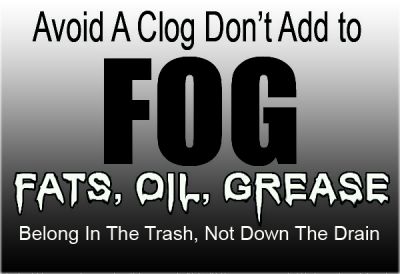Fats, oils, and grease (FOG), is created from all kinds of foodstuffs that are both animal and vegetable based. FOG washed down the drain can stick to the inside of pipes and cause blockages.
FOG
FOG is not just created when oil used for fried foods is poured down a drain. Foods such as frosting, salad dressing, mayonnaise, ketchup, butter, and gravy all contribute to FOG.
 Adding hot, soapy water to liquid grease or greasy foodstuffs and then pouring it down the drain does not prevent FOG; it just moves it further down the pipe. Eventually the grease will cool and harden causing blockages and overflows.
Adding hot, soapy water to liquid grease or greasy foodstuffs and then pouring it down the drain does not prevent FOG; it just moves it further down the pipe. Eventually the grease will cool and harden causing blockages and overflows.
Blockages in sewer lines cause backups and overflows. Raw sewage backups are unsanitary and gross. Backups can damage your property and can be expensive to clean up.
Preventing FOG
- Wipe, do not rinse, dishes prior to washing them by hand or loading in the dishwasher.
- Pour liquid grease from cooking into a metal container, let cool and then dispose of it in the garbage.
- Use a strainer to keep food scraps out of the drain. A garbage disposal only shreds scraps, it does not remove grease.
FOG Management Program
The Pretreatment Program administers the FOG Management Program for commercial and institutional food service facilities.